QuestionToday at my vet's office I was introduced to an 8 month old kitten. She was doused in motor oil, her whiskers burned off, her ears were either burned or frost bitten and her tail has been damaged. I fell in love and decided to bring her home to a family that will love her. Do you think that she will recover from this abuse and trauma? I am taking her in to have her fixed next week and also declawed. I hate to traumatize her yet again but I don't want to add to the pet population! If you have any advise on how to show her she can trust us and that we won't hurt her would be helpful. Right now she just hides, which is understandable. She is all white except for the brown marks caused by the oil and singe marks caused by the burns. We've decided to call her "Angel".
AnswerCassie,
Congratulations on your precious new Angel, she sounds like a really sweet girl. I have seen cats with horrible histories of abuse recover given the love, time and space to do so. In this situation I think that a homeopathic remedy called Bach's Rescue Remedy which is a blend of flower essences designed to calm and reassure might be a good place to start. Normally I recommend administering this remedy by rubbing it into the relatively fur free area of skin either in front of the cat's ears or on the ear flaps themselves, since this would cause your kitty undue pain I recommend that you begin adding 7-10 drops of Rescue Remedy to her drinking water every day until she shows signs of being more comfortable, happy and confident. I suspect that many of Angel's medical treatments have caused her pain so she may very well be a bit wary when it comes to being touched, there's nothing wrong with gently allowing her to come to you on her own terms. You can accelerate that process by putting meat/broth baby food onto your fingers and allowing her to lick it off. She may very well rub against you after licking the baby food off of your fingers so over time this process will encourage her to seek out affection and attention from you and others in your home.
If you have children of your own (or friends who visit frequently with their children) it's important to be absolutely certain that you supervise children closely. Angel's had an awful start in life and she may bear emotional scars as a result of her terrible ordeal so it's crucial that anyone handling this precious Angel does so with respect, love and gentle compassion. It may take some time for Angel to heal from the psychological aspect of her ordeal and the best way to help her along that path is to be loving, patient, gentle and understanding with her even if she does show some fear based aggression. One magical tool that has helped me to help many abused cats and kittens over the years is play, when an abused cat comes into our home we immediately set out to see which toys appeal to him/her so that when all else fails we can help him/her out of his/her shell with gentle play. I am very glad to hear that you're having Angel spayed since pet overpopulation is an incredibly serious issue worldwide and there are countless pets in this world that end up being euthanized in shelters simply because they're not wanted. The wonderful thing about spaying Angel is that you are also sparing her the agony of serious medical issues or the potential to be euthanized simply because she develops behaviors that most people don't want to deal with such as howling for a mate when she's in estrus, using urine/feces to mark her territory or she's simply behaving like an intact cat.
The most common cause of death for cats in North America is euthanasia secondary to behavioral issues that their human guardians can't or won't deal with. As a loving pet parent and a volunteer on this site I do feel that it's my responsibility to provide humane education that helps pet parents to make the best possible decisions for their pet's long term physical/psychological health and overall wellbeing. Although declawing is something that's done quite frequently in North America it's illegal in many countries throughout the world simply because destructive scratching is easily prevented by providing the cats with scratch posts, pads and cat trees of various types and using products like Sticky Paws to deter your cats from scratching your furniture. Sticky Paws is a medical grade double sided tape that can safely be applied to most furniture and flooring and it works well as a deterrent simply because cats hate having their paws stick to anything.
Angel has already undergone horrible pain in her short life and I have serious concerns about exposing her to the unnecessary pain and trauma of being declawed, this surgery isn't necessary and it's exceptionally painful for the cat. Although this surgery is performed quite often very few pet parents are actually aware of the potential for their pets to develop behavioral issues such as house soiling or biting afterwards. I've taken the liberty of providing information about this cosmetic surgery that (in my opinion) is performed on cats way too often. The American Veterinary Medical Association (AVMA) recommends that veterinarians declawing cats administer a long acting narcotic pain reliever once the cat's been sedated for surgery. Before performing the actual procedure the AVMA recommends that the vet administer a four point nerve block on each of the cat's paws that are to be declawed in order to reduce the significant pain caused by this procedure in the immediate post operative period. Veterinarians wanting to ensure that their feline patients don't suffer unbearable pain after they've been taken home to recover send along powerful long acting narcotics such as Fentanyl in the form of a patch to be replaced at specific times recommended by the vet.
Sometimes cats will develop house soiling behaviors shortly after being declawed simply because they are in excruciating pain after enduring 10 (more if the cat has extra digits) amputations on paws that they use for everything from burying their waste to washing their faces. The issues from declawing aren't just something to consider in the immediate post operative period, after hearing about and meeting many cats who have been declawed yet still continue to show signs of discomfort in their paws even years after the fact I've come to the conclusion that declawed cats often suffer something similar to phantom limb pain people experience after losing a limb.
To declaw a cat isn't a simple task and there are serious risks associated with this surgery. People often compare declawing a cat to amputating our fingers at the first joint, but it's just not that simple. Human beings don't use their fingers in the same way that cats use their paws and we can't retract our fingertips. Declaw surgery is extremely painful for the cat and it can have lasting psychological, physical and behavioral problems associated with it. The actual surgery involves amputating the cat's digits, tendons, ligaments and soft tissues at the first joint. If any tissue or bone beyond the first joint remains after the surgery the cat can suffer excruciating pain and possibly an abscess that requires the veterinarian to anesthetize the cat a second time and perform a corrective surgery in an attempt to alleviate the cat's pain caused by the first improperly performed operation.
It's important to remember that cats instinctively dig a hole to urinate or defecate in and most cover their urine or feces afterwards. As a result of the way cats use the toilet there's a substantial risk of infection when they're declawed. Cats who undergo surgery to remove their claws can also lose a substantial amount of blood, it's important to recognize that cats are quite a bit smaller than people and what may look like minor blood loss can be fatal. Cats that have been declawed seem substantially more likely to develop problems with house soiling (possibly related to paws that hurt even years after the fact in some cases). Some cats also develop severe arthritis in their paws after being declawed - this may be as a result of the trauma of the surgery, it might be because declawed cats are often forced change the way that they walk, normal, healthy cats walk on their toes, declawed cats try to reduce their pain by walking on the backs of their feet which means that in addition to the physical risks and problems associated with the surgery declawed cats also lose a substantial amount of the beauty and grace we admire so much.
Some cats undergo drastic personality changes after being declawed which could be as a direct result of the pain caused by the surgery. It's well known that declawed cats are more likely to bite than cats that have their claws and that's dangerous in a household with elderly family members or small children. Cats are normally quite polite when they express their displeasure at being handled improperly or bothered. The signs that a cat's annoyed are usually progressive, there's often a change in body posture and they may flick their tail about - if the subtle messages aren't understood a cat will increase the intensity of the warning by swatting at the person or pet that's disturbing them with sheathed claws. If the cat's wish to be left alone still isn't clear s/he will progress to lightly scratching the person or pet that's upsetting him/her. Cats don't usually bite as a means of defending themselves but if they've been declawed it seems to leave them feeling more insecure and vulnerable which often means that they are more likely to bite someone. Sadly declawed cats are often abused, abandoned, admitted to animal shelters or euthanized because they've developed inappropriate behaviors and human family members are concerned that their cat is going to hurt someone.
Cats use their claws for a variety of purposes. Many people believe that cats sharpen their claws, this is actually a myth - when they claw a scratch post or piece of furniture they're exercising their shoulder and back muscles, stretching their body out and marking the area with their unique scent because cats have scent glands located in their paws, and head. Scent glands are also present on either side of a cat's rectum, that allows other cats who find the droppings to learn about the cat that left them, their age, reproductive status, gender, diet and health problems. Most cats will play with toys using their front paws to bat the toy around so that they can chase it. I've had some amazing experiences with cats who haven't been declawed - there's nothing quite as powerful as a cat using a paw with carefully sheathed claws to gently touch your hand or face as a gesture of love. I'm more than willing to answer any questions or address any concerns that you may have, so please don't be afraid to contact me again, I'll do my best to help you solve the issues that you're having with your kitten. I'd be more than happy to provide you with information about safe, gentle alternatives to declawing Angel if you are interested in learning more about them.

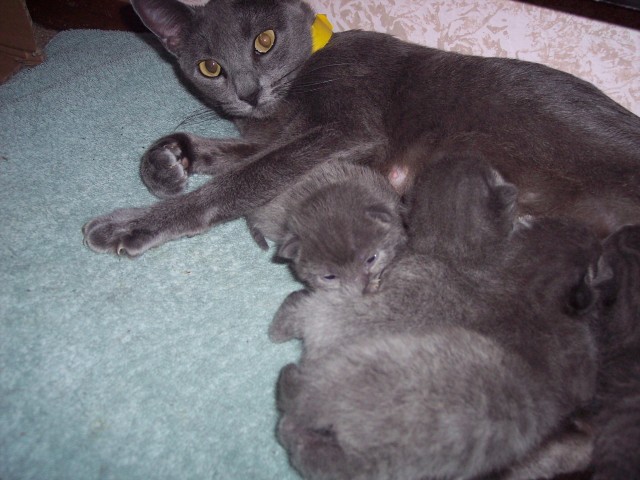 russian blue gene info
QuestionBlue Mom & kittens
QUESTION: I am fo
russian blue gene info
QuestionBlue Mom & kittens
QUESTION: I am fo
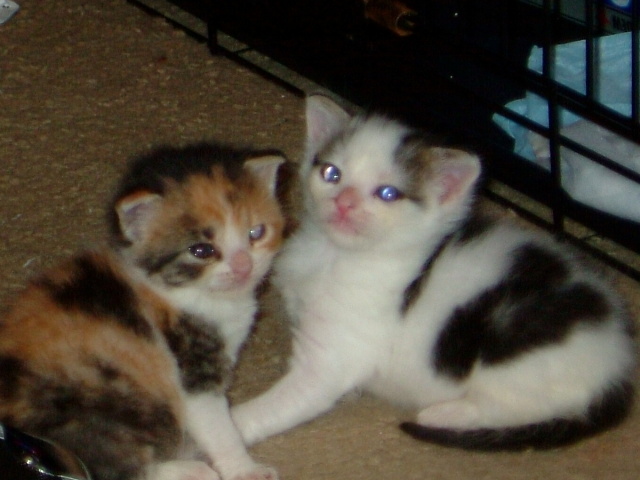 2 Ferals
Question
Sister and Brother at
Hello!
Im so glad I fo
2 Ferals
Question
Sister and Brother at
Hello!
Im so glad I fo
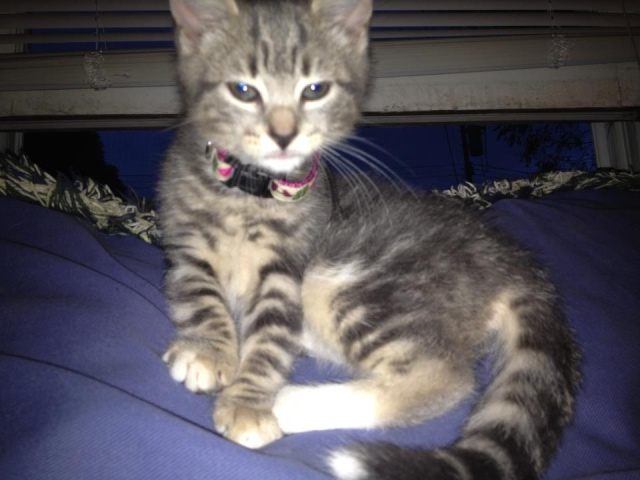 Trimming (crazy) Kittens Claws
Question
tigerlily
I need to trim my kittens nai
Trimming (crazy) Kittens Claws
Question
tigerlily
I need to trim my kittens nai
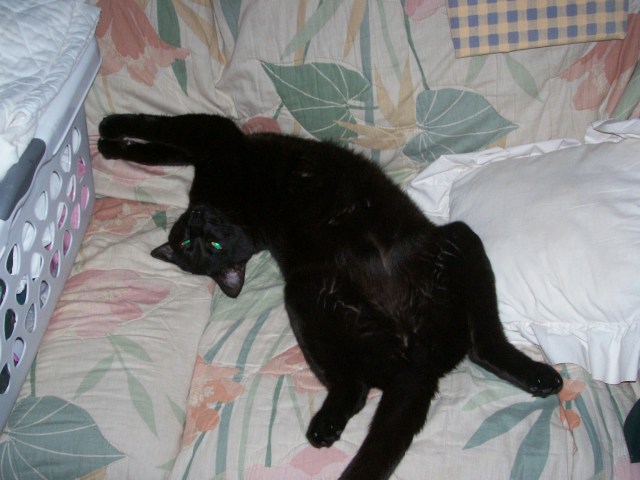 cat breed?
QuestionQUESTION: I have a solid black male cat, and I
cat breed?
QuestionQUESTION: I have a solid black male cat, and I
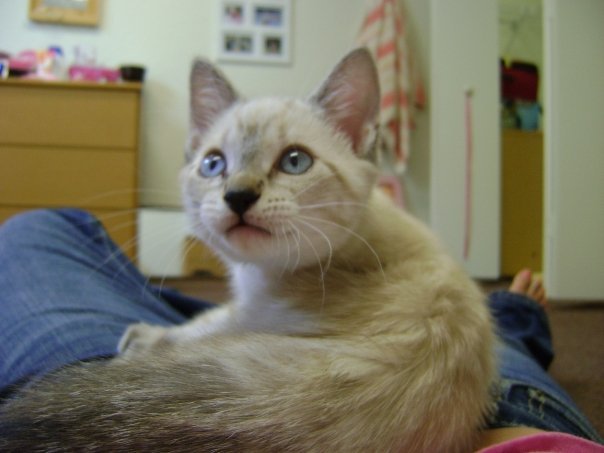 What kind of cat do i have?
Question
Chula
Ive been trying to figure out wha
What kind of cat do i have?
Question
Chula
Ive been trying to figure out wha